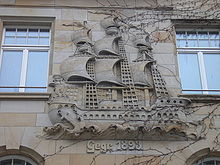Groceries


As grocery previously, particularly for colonial times , overseas food and beverage such. B. sugar , coffee , tobacco , rice , cocoa , spices and tea . Grocer imported these products in grocery stores and - negotiations were sold.
The colonial goods trade was separated statistically from the product trade and from the manufactured goods trade .
term
The term grocery store was still in use until the 1970s . Although they no longer offered colonial goods, they did offer all basic foodstuffs , regardless of the country of origin, as well as soap , detergents , petroleum and other household items . It corresponded to the corner shop in Germany or Switzerland , while in Austria the term Greißler was used. The Wilhelm Holtorf grocery store in Bremen is Germany's last grocery store, while Schwarzenbach grocery store in Zurich is the last in Switzerland. The Swiss Migros still calls part of its range as colonial goods.
The name can still be found in the name of the retail trade association Edeka, which is widespread in Germany ( purchasing cooperative of the colonial goods traders in the Hallesches Torgebiet zu Berlin - E. d. K. for short ).
Picture gallery
Bakery, confectionery and grocery in Roggwil TG , Switzerland
Former coffee roastery and grocery store Unterberger on Herzog-Friedrich-Strasse in Innsbruck
literature
- FW Schulze: The goods knowledge of the colonial goods retail trade , Edeka-Verlagsgesellschaft m. b. H., 2nd edition, Berlin-Wilmersdorf 1932
Web links
- Private site about groceries and grocery stores in Freiburg i. Brsg. as well as reviews on the topic
Individual evidence
- ↑ Grocery store saved
- ^ Heini Hofmann: Curiosity: The last grocery store in Switzerland. In: Lucerne newspaper . May 11, 2018, accessed November 7, 2019 .
- ↑ The return of the colonial goods (Neumarkt 3) - Strings - Eastern Switzerland culture magazine and calendar of events. Accessed June 15, 2020 (German).
- ↑ New Migros Wittenbach building. Retrieved June 15, 2020 .




